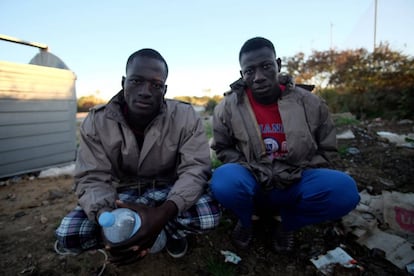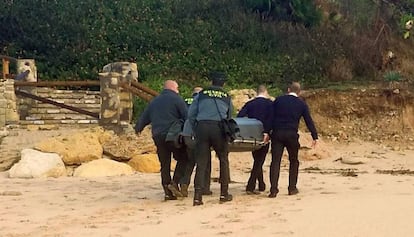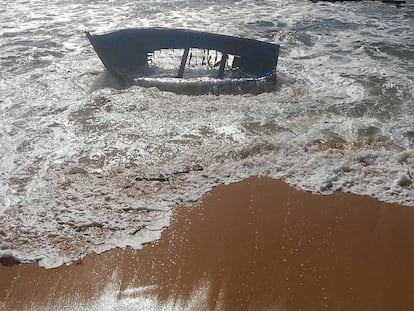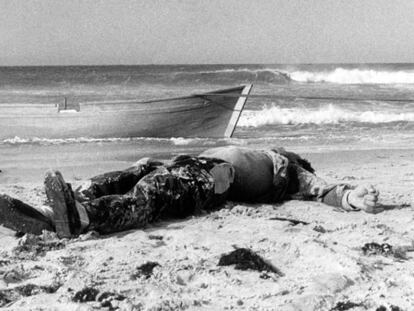Migrant survivor of deadly journey to Spain: ¡°The water was up to our chests¡±
Boussage Gory and Amedi Sukuna recount their ordeal after their boat capsized on Monday in the worst tragedy in the Strait of Gibraltar since 2009

It was 4am and the sea was calm. Over 50 young men prepared to begin their journey to Spain from one of the long, sandy beaches in the Moroccan city of Nador. It did not occur to anyone that the waters might get rough, but when dawn broke on Monday morning, it started to rain. ¡°The boat began to lurch. We were sitting, and the water reached up to our chests,¡± explains Amedi Sukuna, a 22-year-old from Mali who survived the latest human tragedy in the Mediterranean.
They were cold, cold, it was impossible to warm their bodies
Rescue worker at port of Melilla
On Monday, Spain¡¯s maritime rescue services saved 80 people and recovered 13 bodies from two boats found adrift near the Island of Albor¨¢n and Cape Tres Forcas, located around 70 and 20 kilometers from Melilla, respectively. The tragedy is the worst recorded in the Strait of Gibraltar since June 2009, when 10 migrants died in a shipwreck.
¡°There were 25 of us who were saved, thank God,¡± says Boussage Gory, 20, who is also from Mali. According to him, 31 people died that night, 18 more than the official figure.
¡°We were very, very tired,¡± he recalls. ¡°Many of them lost their head and fell into the sea even though the rest of us did everything we could to keep them inside.¡±
Gory himself admits to a moment of madness when he panicked and nearly jumped into the water. ¡°My companions held me back; it is thanks to them that I am alive,¡± he says, sitting outside an overcrowded migrant center in Melilla, a Spanish exclave city located on the northern coast of Africa.

So far this year, 596 migrants have died along the sea route to Spain, according to the International Organization for Migration (OIM). It is the worst figure in a decade, and nearly four times higher than in the same period the year before.
¡°On the same day they left, another 20 migrant boats left as well,¡± says Helena Maleno, a migrant rights activist at the non-profit group Caminando Fronteras who lives in Tangiers and alerts Spanish rescue services when she herself gets a call from migrants in need of help. ¡°[The people on] the boat called us because they were in trouble.¡±
¡°They were cold, cold, it was impossible to warm their bodies,¡± says one of the rescue workers who showed up at the port of Melilla to assist the rescued migrants on Monday afternoon. Workers had plucked them out of their semi-sunken boat, and two of them died on the way back to port. Two more who were ¡°clinging to life by a thread,¡± according to emergency workers, did not respond to resuscitation efforts. An autopsy will determine the cause of death, but observers who were there at the port are blaming the cold and the rainstorm that flooded the boat and soaked its passengers.
The victims have been transferred to the hospital in Melilla, where they are undergoing DNA tests and other procedures in a effort to help relatives identify and claim the bodies.
More deaths near C¨¢diz
Also on Monday, a boat carrying between 43 and 46 Moroccan migrants capsized on its way to Spain. There were 22 survivors, and so far six bodies have been located at sear or washed up on the shore in Barbate, in the southern Spanish province of C¨¢diz. The Civil Guard continues to search for at least 15 more missing migrants, and has arrested the alleged captain of the vessel, as well as his aide. Both are being charged with crimes against the rights of foreign citizens and with homicide.
It is still unclear, however, whether these men were members of the human trafficking ring that organized the trip, as occasionally the captain is simply a migrant with navigation skills who agrees to helm the boat in exchange for a discount in the price of the journey.
English version by Susana Urra.
Tu suscripci¨®n se est¨¢ usando en otro dispositivo
?Quieres a?adir otro usuario a tu suscripci¨®n?
Si contin¨²as leyendo en este dispositivo, no se podr¨¢ leer en el otro.
FlechaTu suscripci¨®n se est¨¢ usando en otro dispositivo y solo puedes acceder a EL PA?S desde un dispositivo a la vez.
Si quieres compartir tu cuenta, cambia tu suscripci¨®n a la modalidad Premium, as¨ª podr¨¢s a?adir otro usuario. Cada uno acceder¨¢ con su propia cuenta de email, lo que os permitir¨¢ personalizar vuestra experiencia en EL PA?S.
En el caso de no saber qui¨¦n est¨¢ usando tu cuenta, te recomendamos cambiar tu contrase?a aqu¨ª.
Si decides continuar compartiendo tu cuenta, este mensaje se mostrar¨¢ en tu dispositivo y en el de la otra persona que est¨¢ usando tu cuenta de forma indefinida, afectando a tu experiencia de lectura. Puedes consultar aqu¨ª los t¨¦rminos y condiciones de la suscripci¨®n digital.










































